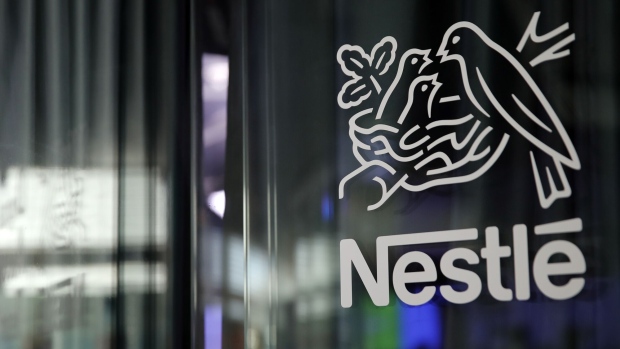Feb 22, 2024
Nestle Forecasts Revenue Slowdown as Inflation Eases
, Bloomberg News

(Bloomberg) -- Nestle SA and Danone are trying to encourage shoppers to buy more branded food products again by easing off on price increases as inflation slows from levels that pushed many consumers to opt for cheaper private labels.
The Swiss maker of Maggi stock cubes said price hikes over the past two years have increased pressure on many households, causing them to switch to store brands or buy fewer goods.
Stabilizing prices, the primary driver of revenue gains during the period of high inflation, is hitting Nestle’s sales forecasts. The company’s outlook disappointed investors, with supply problems in its vitamins business contributing to the downbeat tone.
Revenue should increase about 4% in 2024 on an organic basis after gaining 7.2% last year, Nestle said Thursday.
Nestle shares fell as much as 5.3% to the lowest level in almost four years Thursday morning. Danone erased gains and was little changed at noon in Paris after gaining much as 3.4%. Nestle has dropped 14% over the past year, while its French rival has gained 12%.
“This update will be seen as disappointing” for Nestle shareholders, with a fourth-quarter miss on organic sales growth a concern, said David Hayes, an analyst at Jefferies.
Still, Nestle recorded its first volume growth in a year and a half with its real internal rate of growth positive at 0.4% in the final quarter of 2023. This was driven by consumers choosing more expensive formats after a period of frugality.
But sales of vitamins fell in the second half, Nestle said, adding that the business is taking longer than expected to recover after issues with IT system integration that hampered supply last year, leading to a management overhaul. The company expects growth to start accelerating in the second quarter of 2024.
Chief Executive Officer Mark Schneider told journalists that the company has products that can help people who use obesity drugs like Wegovy avoid nutrient deficiencies. Nestle already gets 1.5 billion Swiss francs ($1.7 billion) in revenue from such products, which include Vital Performance Protein to preserve muscle mass. Food stocks have been dropping recently on concern that the boom in GLP-1s may cut demand.
Read More: Nestle Sees Obesity Drugs Raising Demand for Nutrition Products
Nestle also experienced a hit to sales in majority-Muslim countries where some shoppers boycotted multinationals operating in Israel.
“What we’ve seen is across the Middle East and some countries in Asia, consumer hesitancy in global and western brands,” Schneider said, adding that local brands are benefiting.
Magnum ice-cream maker Unilever Plc had said earlier this month that it was seeing a similar effect. Overall, however, the UK company sold more products like deodorant and mayonnaise for the first time in two years.
Higher Margins
Both Nestle and Danone managed to increase profitability in 2023, and expect another moderate expansion this year, too. Consumer companies’ growing profits have fueled scrutiny from politicians in some countries over pricing practices.
Danone reported that fourth-quarter sales rose in line with expectations amid easing inflation for the yogurt maker.
In his third year as chief executive officer, Antoine de Saint-Affrique is trying to show progress in his turnaround. The company confirmed its mid-term guidance of growth between 3% and 5% for 2024, with a moderate improvement in profitability. Like Nestle, it’s also taking steps to try to get shoppers to buy more of its goods again.
“We have been investing a lot in 2023 to create the conditions to bring back volume/mix for 2024 and beyond,” Chief Financial Officer Juergen Esser said on a call with Bloomberg.
Danone expanded its margin from operations — a measure of gross margin — by 140 basis points in 2023.
(Updates Danone shares, adds comment about obesity-drug nutrition supplements. A previous version of this story was corrected to add the full title and name of Nestle’s CEO)
©2024 Bloomberg L.P.






